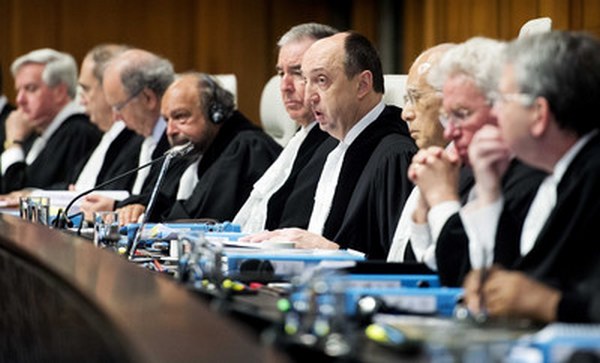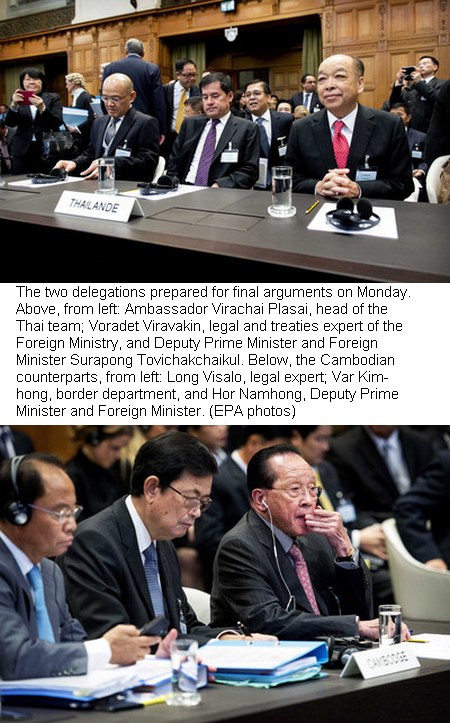Published: 16 Apr 2013
Bangkok Post
Writer: Lamphai Intathep & Thanida Tansubhapol
Cambodia accused Thailand Monday of having
failed to withdraw troops from around the Preah Vihear temple and
unilaterally claiming the border territory surrounding it.
 Judge Peter Tomka (centre) presides over the International Court of
Justice (ICJ) during the case between Thailand and Cambodia over the
Preah Vihear temple. Thailand will make its first oral arguments on
Wednesday afternoon, Thailand time. (EPA photo)
Judge Peter Tomka (centre) presides over the International Court of
Justice (ICJ) during the case between Thailand and Cambodia over the
Preah Vihear temple. Thailand will make its first oral arguments on
Wednesday afternoon, Thailand time. (EPA photo)
The allegation was part of the opening statement Cambodian Foreign
Minister Hor Namhong delivered to the International Court of Justice
(ICJ) as part of a week-long hearing on the territorial dispute which
began Monday at The Hague.
Thailand has also repeatedly attacked Cambodian positions around the
temple and its vicinity, said Hor Namhong, who is also the deputy prime
minister. Graphic on the Preah Vihear temple on the border between Thailand and
Cambodia. The two nations go to court on Monday in a dispute over land
surrounding the site
Graphic on the Preah Vihear temple on the border between Thailand and
Cambodia. The two nations go to court on Monday in a dispute over land
surrounding the site
 Graphic on the Preah Vihear temple on the border between Thailand and
Cambodia. The two nations go to court on Monday in a dispute over land
surrounding the site
Graphic on the Preah Vihear temple on the border between Thailand and
Cambodia. The two nations go to court on Monday in a dispute over land
surrounding the site
The ICJ, also known as the World Court, ruled in 1962 that the Preah Vihear temple belongs to Cambodia.
Thailand has never disputed the court's ruling but deadly skirmishes
have taken place after Cambodia claimed the ownership of a
4.6-square-kilometre patch of land surrounding the temple. Thailand has
insisted the land is part of its territory.
Cambodia asked the ICJ in 2011 to interpret its 1962 ruling to decide on which country owns the surrounding land.
- Protest set: Shams support
- Legal route: ICJ and Southeast Asia
Hor Namhong said Cambodia came under attack during the government of
former prime minister Abhisit Vejjajiva as Phnom Penh sought World
Heritage status for the temple.
Without the ICJ's interpretation of the ruling, there could be
"unfortunate consequences which would prevent the two states from living
in a friendly, peaceful and cooperative environment," Hor Namhong said.
Thailand accepted the court's 1962 ruling but then had a problem in
interpreting the ruling's meaning and tried to reduce its scope, he
said.
He added that Cambodia condemned the border attacks and its request
for the court's interpretation of the earlier ruling should come as no
surprise. The court's upcoming interpretation would provide context to
the 1962 ruling, he said.
"Cambodia wants the court to interpret the 1962 ruling and put an end to the issue," Hor Namhong said.
"Cambodia does not want the court to demarcate the border because it
has already been addressed in the Annex I map which was submitted to the
court in 1962. We just want the court to interpret the ruling."
He said that the ICJ had a role to build peace among nations and it
was expected that the outcome of the interpretation would ease the
dispute between the two countries. One of Thailand's key arguments was
the ICJ has no jurisdiction to rule on the territorial row or decide on
the demarcation.
Franklin Berman, one of Cambodia's three lawyers, conceded that the ICJ's judgement would be final and could not be appealed.
He said, however, in the event of dispute over the meaning or scope
of the judgement, the court could interpret its ruling at the request of
any party.
He reiterated that Cambodia still wants to comply with the court's earlier order and only wants it to be clarified.
Rodman Bundy, another lawyer for Cambodia, said that after the 1962
ruling, Thailand laid barbed wire around the temple to demarcate the
border itself and claimed that there was no objection from Cambodia _
including during a royal visit to the temple by the former Cambodian
monarch, King Sihanouk.
Laying the barbed wire was a unilateral decision made by Thailand, he said.
Cambodia did protest against the action because it wanted to make the line according to the Annex I map, Mr Bundy said.
He argued that Cambodia had tried to oppose the move and it sent several letters of objection to the United Nations.
It was Thailand which caused confusion over the ruling by laying barbed wire as close as possible around the temple, he said.
Thailand will respond to the Cambodian statement tomorrow.
Deputy Prime Minister and Foreign Minister Surapong Tovichakchaikul,
who attended the hearing at The Hague, said Cambodia's presentation came
with no surprises to Thailand's legal team.
"I do believe our legal team has already prepared answers to what Cambodia said today," Mr Surapong said.


No comments:
Post a Comment